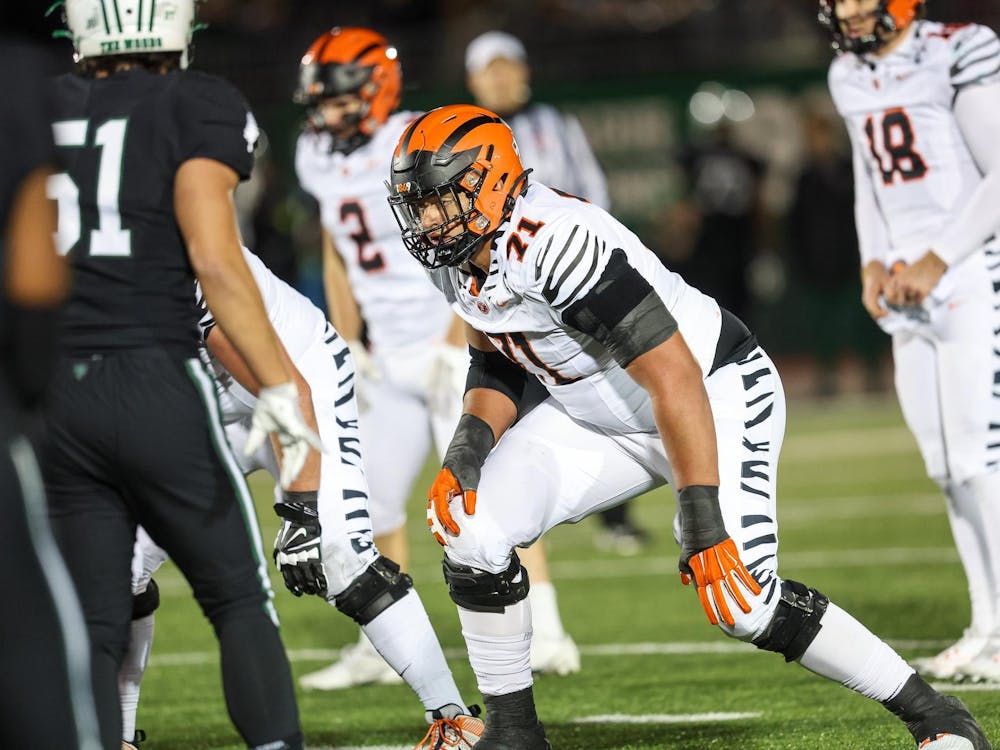Sounds ridiculous, right? And it would be in basketball, a sport in which three trained, impartial referees are hired to make calls in every game. But that scene would be anything but ridiculous in college squash. Without professional referees, the teams themselves are in charge of officiating regular-season matches — and in a conference as competitive as the Ivy League, players are often put in the uncomfortable position of deciding their own team’s fate.
Each squash match is overseen by two officials: a referee and a marker. In team competition, the away team supplies the referee for odd-numbered matches and the home team for even-numbered matches, with the marker representing the opposite side; usually, they are two players who have just faced each other. The marker’s main responsibility is to keep score while the referee makes all final officiating decisions. Most of those rulings come when one player feels his shot was obstructed by his opponent, in which case the referee can call a “stroke” (a point to the obstructed player), a “let” (replaying the point) or “no let” (if there was no interference).
The only other college sport in which rulings are made by invested parties instead of neutral referees is tennis, which trusts players to call their own lines on their side of the court. But even in tennis, players only have to judge whether a ball landed in or out, an inherently objective call that leaves little room for biases to come into play. In squash, the decisions are much more complex — the College Squash Association’s flowchart for determining a let or stroke has no fewer than nine steps, most of which involve highly subjective judgments.
Most players have done their share of officiating — at individual youth tournaments, players typically referee the match after their own — but they still don’t have the training or experience of professionals. Though they try to make calls quickly and confidently, referees are sometimes faced with ambiguous situations in which both sides have a case, which is even more nerve-racking when the match is close. “When it’s coming down to the wire, you definitely feel the pressure,” junior Ash Egan said.
The referee’s role is often magnified during the closest matches, in which points last longer and players may get more aggressive. When the women’s squash team hosted then-No. 1 Harvard last month, freshman No. 4 Rachel Leizman was down match point in the fifth game when she received a controversial let call from a Princeton referee. Leizman went on to win the next three points for a comeback victory, which was ultimately the difference in the Tigers’ 5-4 victory. The Ivy League title and the No. 1 ranking swung on that one decision, which had Harvard fans grumbling about “that terrible Princeton ref” and mulling avenues for a protest (though Princeton fans might have been just as upset had the call been reversed).
Few doubt that almost all player-refs try their hardest to be impartial and make the correct call in every situation. Especially in the tight-knit world of college squash, where many players and coaches have known each other for seemingly forever, the reputational penalty of being labeled a cheater would be very harsh. But there are hidden biases that simply can’t be eliminated. In their 2011 book “Scorecasting,” Tobias Moskowitz and Jon Wertheim present evidence suggesting that professional referees tend to favor the home team — especially in critical situations — by subconsciously taking signals from the crowd. How much stronger could that bias be when a ref’s cues come not from spectators but from a trusted teammate?
The women’s squash team won’t have to worry about those biases as much at the Howe Cup this weekend; in the first two rounds, the College Squash Association will have “roving referees” monitoring play, and if Princeton reaches the championship, professionals will officiate on every court. But the men, on the heels of their first loss in a calendar year, will host new No. 1 Trinity in their regular-season finale on Saturday.
Jadwin will certainly be rocking for the latest installment of college squash’s best rivalry. But before you start berating a Trinity referee (or a Princeton one) for his calls or non-calls, remember that they aren’t professionals, and they — just like the players — are also under pressure.







